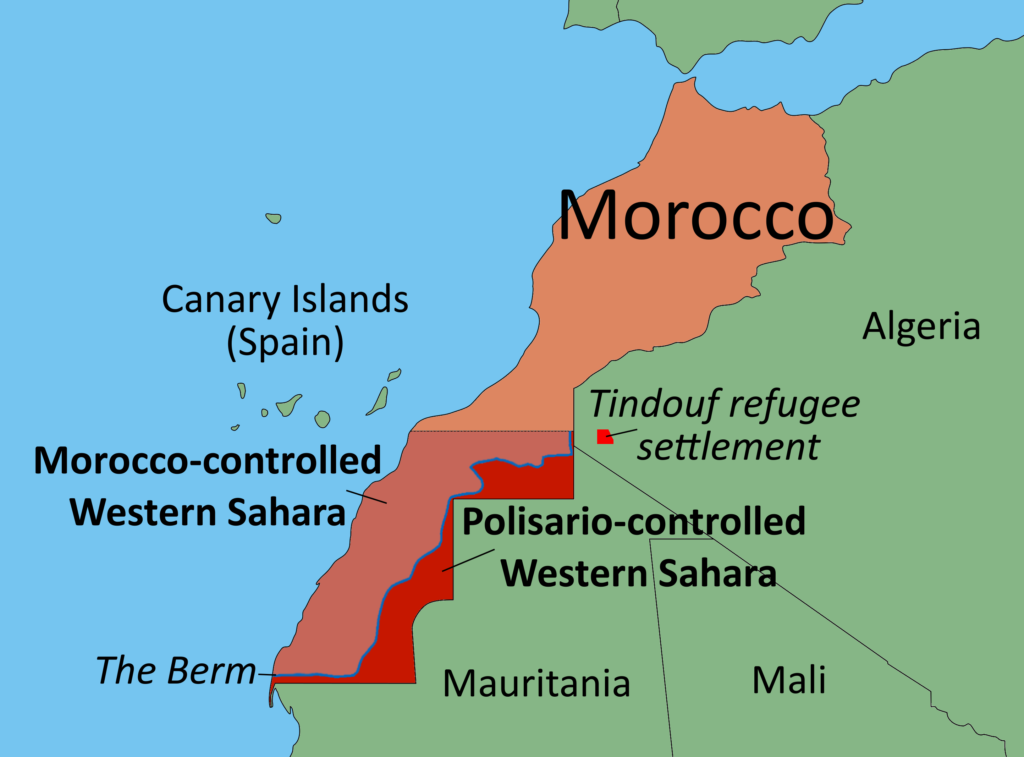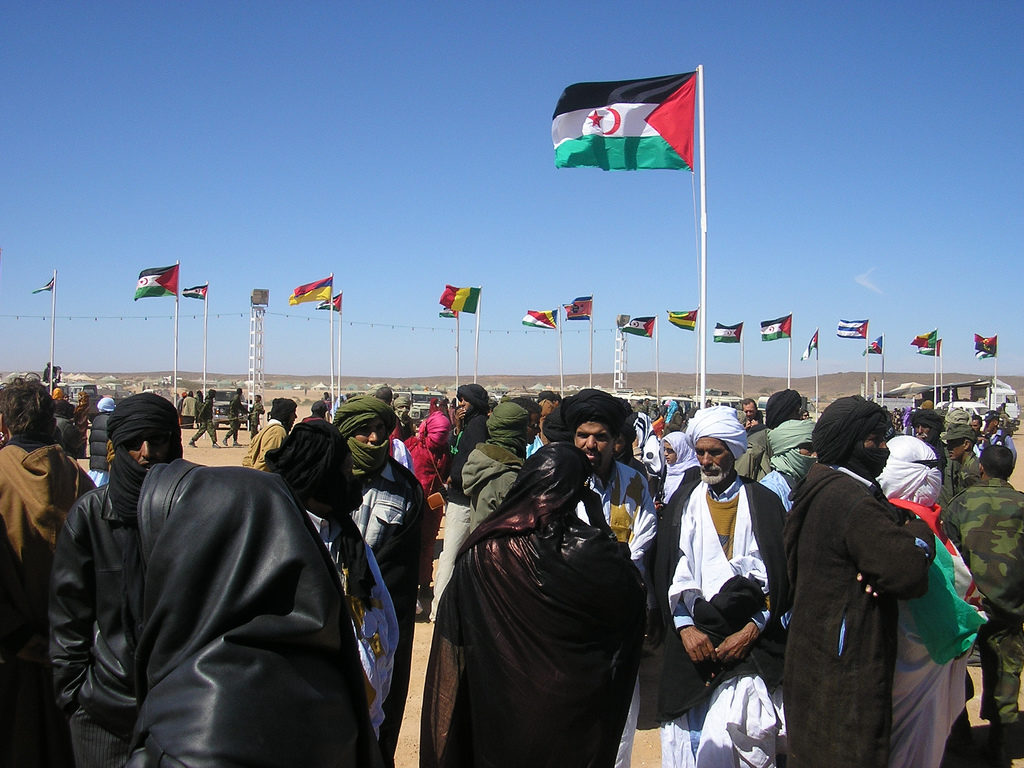Western Sahara: the Polisario Front
Prolonged stalemate keeps the conflict unresolved and refugees in exile
A 2,700km wall of sand and stone separates the territory of Western Sahara into two parts. This berm, which varies in height from two to five metres, is supported by bunkers, barbed wire, radar systems and landmines. It separates the western Atlantic Ocean coastline of Africa’s last colony from the eastern Sahara. The military fortification stands as a symbol of the longstanding political struggle, which has divided this mainly desert territory in north-west Africa.
For nearly four decades since Spain relinquished its rights to its former colony, bordered by Morocco, Mauritania, and Algeria, Western Sahara has been under dispute. The Frente Popular de Liberación de Saguía el Hamra y Río de Oro (Polisario Front), a nationalist movement, seeks the territory’s independence. Morocco, which built the embankment, regards it as the southern extension of its kingdom.
The unresolved conflict over this land, which is rich in phosphates and fish and believed to have oil and gas deposits, has produced enormous human suffering: some 14,000–21,000 soldiers and civilians died during the 16-year-long war between 1975 and 1991. Since then, 90,000–100,000 refugees have been living in neighbouring Algeria under extreme desert conditions.

Reports of protest and repression in the Moroccan-controlled territory west of the berm continue to leak out. Between 100,000 and 140,000 Moroccan soldiers protect three-quarters of the territory, which includes all major cities, harbours, and phosphate mines. The Polisario’s provisional government, headquartered near the refugee camps in Algeria, controls the undeveloped eastern side, which is inhabited by about 20,000 nomadic Saharawis.
For Morocco, the Western Sahara is a “separatist” issue: treasonous royal subjects from what it calls the “Southern Provinces” are fighting to secede. Its neighbour and long-time regional rival, Algeria, which is said to strive for an outlet to the Atlantic Sea, is backing them. Morocco sees Saharawi refugees as Polisario hostages, without the right of return to their home territory. It also claims that the Polisario Front is closely related to terrorist Islamist movements in the Sahel region, without providing clear evidence. Such a connection is highly improbable, however, since the Polisario Front is a secular movement rooted in the ideologies of Arab nationalism and socialism. It has always denounced terrorism and has never applied it in its struggle for self-determination. Its main ally Algeria would never tolerate any collaboration with Jihadist groups.

From the perspective of the Polisario Front, the Western Sahara is an unresolved case of decolonisation and its inhabitants are waiting for their right to self-determination. Following a wave of nationalism that spread throughout Africa in the 1960s, the Polisario Front established itself in May 1973 and soon after started the liberation struggle against the Spanish colonial power.
An October 1975 advisory opinion of the International Court of Justice in The Hague conceded certain historic and cultural bonds between the territory and its neighbours Morocco and Mauritania and recognised the Saharawis right to self-determination. Spain then agreed to organise a referendum but later struck a backroom deal with nearby Morocco and Mauritania. It divided the territory between the two in return for temporary fishing rights and shares in the phosphate mines. Madrid, however, made this deal without consulting the colony’s inhabitants.
When the Moroccan and Mauritanian armies arrived to secure their respective sections in 1975, the Polisario Front took up arms to defend its right for self-determination. Shortly after Spain left, the Polisario Front proclaimed an independent Sahrawi Arab Democratic Republic (SADR) on February 27th 1976.
As a result of the Moroccan and Mauritanian invasion, many inhabitants fled in 1975-76 to neighbouring countries, especially to the inhospitable Tindouf region in south-west Algeria. Since then, generations have lived in five Polisario-administered desert camps there. Some have been waiting for nearly four decades to return.
No one agrees on the number of Sahrawis in exile. The Polisario Front says around 160,000 are living near Tindouf, whereas Morocco concedes only about 10,000. Aerial images and the number of food rations handed out by international agencies indicate that between 90,000 and 100,000 refugees may live in these camps. To make the matter trickier, the Algerian government refuses to conduct a census of the camps’ population on its territory.
The SADR’s provisional capital is situated near the refugee camps in Algeria. Around 50 states recognise the SADR, mostly African and Latin American countries. The Organisation of African Unity, the African Union’s predecessor, admitted the SADR in 1984, which prompted Morocco to quit the OAU, and it has refused to join the AU for the same reason. Nigeria and South Africa are among sub-Saharan Africa’s most vocal supporters of the SADR, whereas French-speaking African countries and most Arab League members tend to be more sympathetic to the Moroccan position.
The UN position is clear: decolonisation has not been finished and the population must choose between independence and inclusion into Morocco. As a result, not a single country has yet recognised Moroccan sovereignty over the Western Sahara. Since 1960, the UN has adopted several declarations recognising the right of former colonies to self-determination. It recognised the Polisario Front as the representative of the people of Western Sahara in 1979.
When the war ended in a stalemate in 1991, the UN and the OAU brokered a deal between Morocco and the Polisario Front. (Mauritania had withdrawn in 1979 after suffering heavy military defeats by Polisario fighters.) MINURSO, the French initials of the UN Mission for a Referendum in Western Sahara, was sent to the territory with two tasks: to monitor the ceasefire and to hold a referendum.
Morocco accepted half-heartedly. Politicians in Rabat, however, have always expressed the view that it is nearly impossible to define legitimate voters in a nomadic context, an argument which would rule out democracy in many parts of Africa. The UN mission identified 86,386 voters, but the process came to a standstill in 2000 when 130,000 individuals, who were backed by Morocco and belonged to nomadic tribes in the wider region, appealed to be counted. The UN/OAU settlement plan stipulates that only the inhabitants of the former Spanish colony and their descendants have the right to vote.
Despite the decades-long deadlock over holding the referendum, both sides have respected the ceasefire since 1991. But even prominent mediators such as former US secretary of state, James Baker, have not succeeded in achieving a diplomatic resolution. Morocco is gradually moving away from the referendum plan and now offers a negotiated autonomy instead. But the Polisario Front insists on a UN organised referendum, which could include autonomy as a third option in addition to full independence and full integration into Morocco.
Morocco has invested considerably in the territory it controls. It has built airports, houses, schools, hospitals, factories and infrastructure, spending about $2.4 billion in 30 years, according to a 2007 report by the International Crisis Group, a Brussels-based think-tank. The territory has considerable economic potential, since oil and gas resources are expected along the coastal region, and the prospects for renewable wind and solar energy are favourable. Morocco has also encouraged many of its citizens to move to Western Sahara and Moroccans are now considered to be in the majority. As a result, many of the remaining Sahrawis feel disadvantaged.
Morocco has banned the Polisario Front and made any calls for independence a crime. In recent years, young Sahrawis have repeatedly protested against unemployment, living conditions and Moroccan exploitation of the territory’s resources. Moroccan security forces have stopped many demonstrations and have killed several protesters in these clashes or sentenced them to long prison terms. Human rights groups accuse Morocco of torturing Polisario sympathisers and there is increasing international pressure to include human rights monitoring into the MINURSO mandate. However, Morocco and France have succeeded so far in preventing the UN from expanding MINURSO’s mission.
Four decades after the end of Spanish rule, a solution is not in sight. Despite regular talks under UN auspices, the two parties remain wide apart. Morocco has the advantage that it can count on influential Arab and Western allies, especially France. In the meantime, the SADR remains a government in exile and many Sahrawis continue living in desert camps with little hope.
[author] [author_image timthumb=’on’][/author_image] [author_info]Martin Pabst is a political scientist and freelance researcher based in Munich. He is a regular contributor to German-language journals such Austrian Military Journal, European Security & Technology, S+F – Security and Peace. He researched in the Western Sahara, at MINURSO and in the Sahrawi refugee camps in Tindouf, Algeria. [/author_info] [/author]


